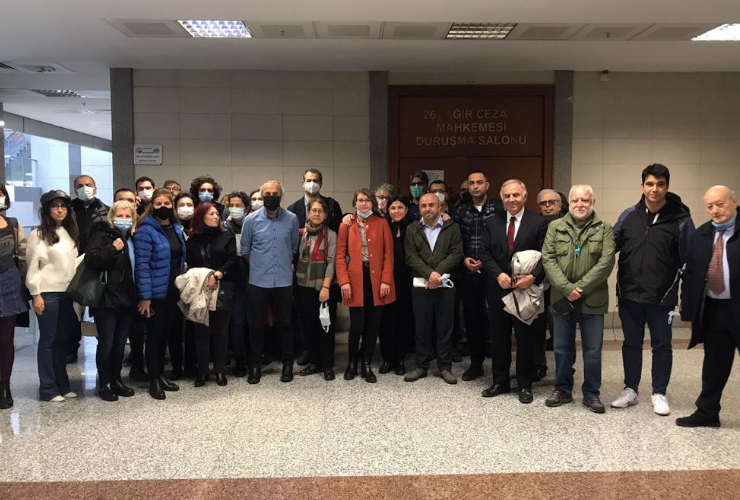International Press Institute (IPI) representatives monitored the December 1 hearing of four Cumhuriyet journalists and editors on trial for reporting on illegal construction carried out on a property rented by Presidential Office Communications Director Fahrettin Altun. IPI representatives showed their solidarity with the journalists, as did representatives of many other international and local journalists associations, including Reporters Without Borders (RSF), and the Journalists’ Union of Turkey (TGS).
Below are the observations from IPI representatives on the December 1 hearing.
December 1, 2021
By mere design or by an error that no one will probably admit to, the gargantuan campus of the justice hall at the heart of Istanbul’s bustling Şişli district also serves as an artificial wind tunnel. Caught in the crosswinds blowing through the arched promenades crisscrossing the complex, an unsuspecting pedestrian headed to the courthouse one moment may easily find herself brutally pushed in the opposite direction the next—most likely towards the coffeeshop of global renown and overpriced caffeinated beverages. It is one of life’s greatest mysteries that both the wind and international coffee chain have yet to be charged as co-conspirators in a plot to obstruct the Turkish justice system.
On the afternoon of December 1, 2021, however, no force of nature was too strong to penetrate the close ranks of the resolute members of the Turkish Journalists Union (TGS), who had gathered in front of the courthouse to support their colleagues from Cumhuriyet on many levels. Spotted easily among the crowd with their white vests bearing the bold dark green acronym of their organization, the TGS members first and foremost voiced their solidarity with the Cumhuriyet journalists on trial on that day.
Urban and environmental reporter Hazal Ocak, former editors İpek Özbey and Olcay Büyüktaş, and photojournalist Vedat Arık were being tried for reporting on the building code violations committed at the villa owned by Presidential Communications Office Director Fahrettin Altun on the coast of the Bosphorus. The judges were expected to issue a verdict at today’s hearing; and if convicted, the journalists faced over three years in prison.
But this was not the sole purpose of the TGS’s presence at today’s hearing. Holding small banners displaying “Cumhuriyet Sendika” (Cumhuriyet Union) and “#Cumhuriyet Biziz” (We are Cumhuriyet), the union drew attention to the firing of eight Cumhuriyet staff members for joining the TGS and negotiating a fair price and working conditions deal with the newspaper. (Shortly after the writing of this article, the newspaper administration rehired the employees due to a strong reaction from the public and on social media). Aykut Küçükkaya, editor-in-chief of Cumhuriyet at the time (he resigned from his post next day), joined the crowd and expressed his disappointment with the newspaper for its decision to part ways with its staff on the eve of such an important trial instead of showing solidarity with its current and former employees whose freedoms were at stake.
In a brief statement before she made her way into the courthouse, Hazal Ocak also expressed that she felt as if she had been abandoned by her newspaper on such a fateful day. Accompanied by her close relatives and friends, Hazal pointed to the brute fact that she was being tried and facing three years in prison because she defended the public’s right to the news by reporting on the illegal construction of a fireplace and a pergola in a house owned by a senior government official. “Journalism is not a crime,” Ocak protested as she concluded her remarks.
No sooner had the hearing started than it went into a recess. Many of us observers, who were not admitted into the courtroom due to the pandemic measures, were surprised since this was a verdict hearing. The fact that the judge was going into recess this early into the session could not have been good. Shortly thereafter, the judge called only the defendants and their counsels back into the room. On the outside, we held our breath. A few minutes later the doors were opened, and the defendants appeared with a faint expression of relief on their faces as they walked out: the case was adjourned until March 31, 2022, to gather more information and evidence on the illegal construction. A relative of one of the defendants broke down in tears. Another one was heard murmuring, “This is exactly what they are trying to do: torture the defendants and their loved ones by dragging us here once every few months. This is their strategy.”



